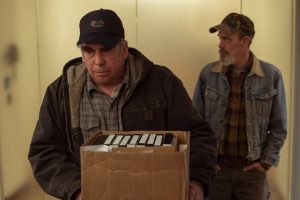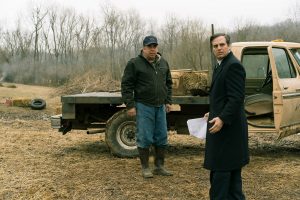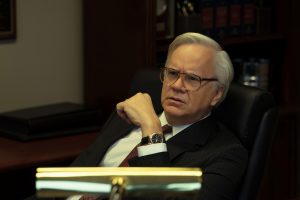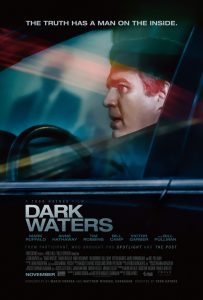‘Dark Waters’ pushes us to test – and surpass – our limits
“Dark Waters” (2019). Cast: Mark Ruffalo, Anne Hathaway, Tim Robbins, Bill Camp, Bill Pullman, Mare Winningham, Victor Garber, Louisa Krause, William Jackson Harper, Richard Hagerman, Denise Dal Vera, Scarlett Hicks, Bella Falcone, Jim Azelvandre, Kevin Crowley, Jeffrey Grover, Kelly Mengelkoch, Annie Fitzpatrick, John Newberg. Director: Todd Haynes. Screenplay: Matthew Michael Carnahan and Mario Correa. Story: Nathaniel Rich, “The Lawyer Who Became DuPont’s Worst Nightmare,” The New York Times Magazine, 2016. Web site. Trailer.
At some point in our lives, many of us come face to face with situations where we need to make difficult choices and engage in challenging tasks, simply because they’re the right thing to do. Such efforts may test us severely, pushing us to the brink of – and possibly beyond – what we think we’re capable of. Those can be hard times, for sure, but, when we consider what’s at stake – and what we can gain by willingly choosing to act – we’re likely to see that we must do what we do if we’re to live with ourselves. So it is for a beleaguered protagonist in the new fact-based legal thriller, “Dark Waters.”
Attorney Rob Bilott (Mark Ruffalo) enjoys a comfortable and successful life as a corporate attorney in Cincinnati. He’s made a good career for himself representing companies in the chemical industry, most notably DuPont, one of his firm’s most important clients. In fact, his legal defense work for that organization contributed significantly to him making partner and becoming one of the most trusted advisors to managing partner Tom Terp (Tim Robbins). And, outside of work, Rob is happily married to his wife, Sarah (Anne Hathaway), who gave up her career as a lawyer to become a stay-at-home mother of three. It seems like everything is going his way – that is, until someone walks into his office one day and changes his life forever.

Intrepid attorney Rob Bilott (Mark Ruffalo, center) does an about-face by suing the chemical company giant he once represented in director Todd Haynes’s fact-based legal thriller, “Dark Waters.” Photo by Mary Cybulski, courtesy of Focus Features.
While conferring with his fellow partners, Rob is called out of the meeting when he’s asked for by name by someone he’s never met, West Virginia farmer Wilbur Tennant (Bill Camp). Utterly perplexed, Rob asks Wilbur why he specifically wants to see him, to which the stranger replies that he was recommended by one of Rob’s relatives from back home in Parkersburg, WV, where the attorney spent many of his summers while growing up. When Rob then inquires about the nature of Wilbur’s legal needs, the farmer tells him that contaminants had seeped onto his property and poisoned the drinking water source for his herd of cows, killing 190 of them. Wilbur then points the finger at the culprit he believes is behind this problem – the DuPont organization.
Rob tells Wilbur that, since he represents DuPont, it’s unlikely he’ll be able to help him. But something about Wilbur’s story troubles him, so Rob drives to Parkersburg to investigate further. Upon witnessing the harm inflicted on Wilbur’s farm, he feels compelled to see if there is any way he can help. And so, upon returning to Cincinnati, he consults with his peers to discuss an equitable way to work out the situation between Wilbur and DuPont. Rob approaches DuPont executive Phil Donnelly (Victor Garber) to propose negotiating a settlement arrangement, and the company initially agrees to cooperate. But, before long, matters take a left turn, and the deal is off.
As Rob begins to discover more of what’s really going on in Parkersburg, he sees a bigger problem than just the deaths of Wilbur’s cows. He wants to help those who have been hurt, but he’s also got his obligations to his firm and to DuPont as a client. But, after an anxious discussion with Tom, he persuades the managing partner to back him in his plan to take on the chemical company giant, despite the stakes involved.

West Virginia farmer Wilbur Tennant (Bill Camp, left) seeks to sue chemical giant DuPont after losing 190 cows to contaminated drinking water as seen in the new fact-based drama, “Dark Waters.” Photo by Mary Cybulski, courtesy of Focus Features.
Challenging one of the country’s largest and most beloved companies quickly proves to be a much bigger undertaking than anticipated. Rob becomes buried in piles of discovery materials submitted in hopes that the sheer volume will discourage him in his quest. But he’s not the only one who is taken to task; Wilbur comes under fire, too, as Parkersburg residents shun the man who has decided to threaten the community’s largest employer and the livelihood of its many workers, most of whom would be lost without their jobs at DuPont. Despite those obstacles, though, Rob meticulously reviews the discovery materials, and Wilbur sticks to his guns to proceed, public reaction notwithstanding.
Circumstances quickly escalate for all concerned. The long hours involved in reviewing the discovery materials take a toll on Rob’s physical and emotional well-being, as well as the health of his marriage. But, when Rob meets with a chemical expert (John Newberg) and learns what’s behind the pollution, he’s shocked. He discovers that the drinking water has been contaminated with “forever chemicals” – those that don’t break down in the body and accumulate over time – to such an extent that much of the Parkersburg community – and users of products containing these chemicals outside of the area – could well be affected.
The greatest concern involves a substance known as PFOA-C8, a chemical that goes into making Teflon. The chemical was originally developed to help protect the exteriors of army tanks but was later adapted for consumer product use, most notably in manufacturing nonstick cooking pans. As Rob learns through his discovery review, DuPont’s own studies revealed that the chemical caused cancer in animals and humans and birth defects in the unborn children of women working at the company’s facilities. This discovery led to ongoing monitoring programs on animals and the organization’s employees – and was implemented without saying a word about the danger. With huge volumes of toxic sludge containing the chemical dumped up river from Wilbur’s farm, it’s not hard to see how his cows became sick – or how Wilbur and his wife, Sandra (Denise Dal Vera), subsequently followed suit.
To make matters worse, PFOA is an unregulated substance, one for which there is no government oversight, including the determination of environmental safety levels, thereby muddying the waters about adequate protection and potential liability. How much is too much? Who makes the determination? What constitutes a violation? And what are the penalties for noncompliance?

On his farm outside Parkersburg, WV, farmer Wilbur Tennant (Bill Camp, left) shows attorney Rob Bilott (Mark Ruffalo, right) the extent of the damage done to his property and livestock in “Dark Waters.” Photo by Mary Cybulski, courtesy of Focus Features.
Thus begins a protracted legal battle. DuPont offers to settle with Wilbur, a proposal Rob encourages him to accept, but he refuses, contending that he wants justice more than money. In the wake of this, Rob submits a brief to the Environmental Protection Agency and the Department of Justice that incorporates DuPont’s internal information found during discovery, a move that leads to a sizable fine from the EPA.
However, despite this result, Rob is not satisfied, given that Parkersburg residents will be affected by this problem for the rest of their lives. He subsequently prepares a class action lawsuit when Parkersburg resident Darlene Kiger (Mare Winningham) and her second husband, Joe (Richard Hagerman), come forward with a letter they received from their local water district warning them of the presence of PFOA in their drinking water. Upon receiving this notification, Darlene recalls that her first husband, a DuPont chemist, cautioned her about the dangers of handling his work clothes in light of possible PFOA contamination and the health implications for women and unborn children. Even with taking this precaution, Darlene still needed to undergo an emergency hysterectomy several years later.
This revelation leads to a community-wide medical monitoring program to determine how many Parkersburg residents are affected. The seven-year study, which ends up testing 70,000 people, tries the patience of all concerned, as well as Rob’s own physical health. But, when the results come in, the door to justice opens at last.
Stories like this outrage most of those who hear about them. One wonders how any individual or organization, in all good conscience, could allow circumstances like this to go on for as long as they did. It raises serious questions about priorities. But, to understand the answers to those questions, one needs to look at the underlying beliefs driving them, for they determine the outcome that emerges through the conscious creation process, the philosophy that maintains we harness these powers in manifesting the reality we experience.
In a scenario like this, where profits are placed before people, it’s not difficult to see what beliefs are at work. This is a prime example of the practice of un-conscious creation, where achieving a particular outcome is viewed as paramount, regardless of whatever consequences may accompany it. Even in the most benign of circumstances, this can be a problematic course to follow, for there may be all manner of unintended side effects and fallout. In a situation like this, where the company knowingly engages in this sort of behavior, it’s difficult to believe that it couldn’t envisage the negative consequences, especially after its own studies found them to be occurring. This suggests that the power of the overriding beliefs is so strong that it’s like an unstoppable juggernaut, collateral fallout aside. Of course, when this occurs, there’s usually hell to pay eventually, as DuPont finds out when it’s hauled into court, undoubtedly another side effect that likely was not part of the original intent.

Tom Terp (Tim Robbins), managing partner of a Cincinnati-based corporate law firm that specializes in defending chemical companies, struggles with what to do when one of his organization’s partners wants to sue one of its biggest clients in director Todd Haynes’s “Dark Waters.” Photo by Mary Cybulski, courtesy of Focus Features.
As noble and high-minded as taking on a cause like this might seem, doing so may prove more challenging than anticipated given the power of the beliefs employed by the opposing party. This means that the crusader pursuing such a quest must be equally firm in his, her or its beliefs to counter the opposition. And this usually requires having one’s metaphysical ducks in a row to pull that off.
Fortunately, Rob had those elements in place in his efforts. For example, his beliefs were rooted in integrity, a keen awareness that he was doing the right thing. This becomes especially apparent in a scene that has nothing to do with a courtroom or law office; it’s a late night at the Bilott home when he’s noisily and frenetically rummaging through the kitchen pots and pans, a clamor that awakens his pregnant wife and prompts her to think her stressed-out husband has lost it. However, when he calms down and earnestly explains the staggering ramifications behind what PFOA can do when it makes its way into the home and into one’s bloodstream – especially that of an expectant mother – the sincerity behind his beliefs becomes all too clear. And, when he applies the same level of conviction to his legal efforts that he does in explaining the situation to Sarah, the strength of those beliefs is obvious – and equal to those being put forth by the other side.
In addition to the integrity underpinning his beliefs, Rob approaches his work with unbridled fearlessness, a heroic courage that drives him to keep moving forward despite the potential consequences that could befall him and his law firm. In taking on Wilbur’s case (and, eventually, that of all Parkersburg residents), he runs the risk of losing a lot – his career, his financial well-being, his health and his marriage, to name just a few items. He also faces the possibility of losing credibility and being labeled a hypocrite, given that, prior to the West Virginia cases, he made a rather comfortable living advising chemical companies how they could pollute the environment without breaking the law. But, considering what he sees has happened, is happening and will likely continue to happen if not challenged, he knows someone has to step up to the plate and take on the forces behind these incidents, no matter how imposing they may seem and how much clout the perpetrators may have with a conciliatory government, their faithful customers and their loyal employees.
When all is said and done, Rob comes to know that this is the path he must follow. No matter what hardships, trials and tribulations might come his way, he realizes that taking on this challenge is his destiny, what conscious creators call value fulfillment, the practice of being our best, truest selves for the betterment of ourselves and those around us. And, because of this, he arms himself with the beliefs needed to make his cause work. And that is true conscious creation at work.

“Dark Waters” is one of the most important films to come along in quite some time, not only for the heroic example it sets both practically and metaphysically speaking, but also because of the cause it champions – that of individuals taking back their personal power. It’s unfortunate that it hasn’t received more attention than it has, given that it truly deserves it. Despite some occasional tendencies toward being formulaic, director Todd Haynes’s new fact-based thriller explores the efforts of a determined community, led by a courageous and ethical attorney, to take on a major chemical corporation hiding the dangers of its products and the fallout that comes with it. The film’s excellent script does a fine job explaining the complex litigious questions involved, detailing the implications of the crusaders’ actions without resorting to jargon or unfathomable legalese, and in outlining the complicated science at the heart of the case. Then there are the superb performances of Ruffalo as the heroic lawyer and Camp as his outraged and victimized client. This is an important story, one that’s well told and doesn’t hold anything back, a tale that should inspire us all to action when it comes to tragedies such as this.
We’re indeed fortunate to have individuals like Rob Bilott in our midst. Were it not for his efforts, the residents of Parkersburg – and even the world beyond its borders – might not have had someone to champion their cause, one that carries implications far greater than what was originally imagined. Succeeding in tasks such as this may require wading into some very dark waters, a prospect many of us would be loath to face. But, thankfully, the beneficial outcomes of these ventures frequently prove worth it, aiding us all when the odds are seemingly stacked against us.
Copyright © 2019, by Brent Marchant. All rights reserved.




Leave A Comment